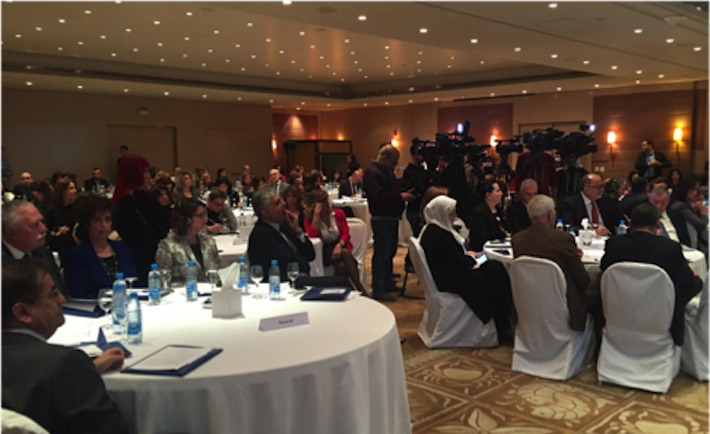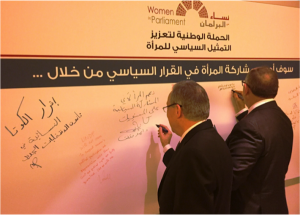
Members of the Women in Parliament coalition of Lebanon gather to discuss introducing a quota for women's representation into the election law.
Lebanese women have a long legacy of leadership in business, media, the arts and academics. Despite these contributions, and the fact that we make up half of the population, Lebanese women have been largely excluded from active participation in the country’s political life. The numbers tell part of the story: only one of the 24 cabinet positions is held by a woman, only 3.1 percent of parliament seats are held by women and just 4.2 percent of municipalities are represented by women.
The story, however does not stop with the numbers. In fact, these dismal numbers motivated members of Lebanese civil society to come together in 2012 to launch the “Women in Parliament’” coalition. Comprised of women’s groups and activists that represent Lebanon’s diverse political and social fabric, the coalition embarked on a campaign to convince politicians of the importance of women’s contributions in elected office. NDI worked with this dedicated group of women as they developed their strategy and messages to appeal to politicians, presenting evidence-based arguments for why women’s participation contributes to better governance.
Today, the coalition is taking the next step. For years, women’s rights groups including Women in Parliament members, have fought to convince Lebanese officials that introducing a quota into the election law is an important and necessary step to increase women’s participation. Coalition members contributed to the debate by adopting a review of technical mechanisms to implement the quota under different electoral systems. Convinced by the findings of this study, Nabih Berri, speaker of the parliament, has invited his fellow members of parliament (MPs) and civil society to a ground-breaking session about how to implement the quota.
This session marks the first opportunity for a genuine two-way communication between MPs and women’s rights activists -- tackling together the opportunities and challenges, difficulties and solutions, traditions, and changes needed to bring women to the table.
MPs who serve on the Parliamentary Committee, which is charged with reforming electoral law, participated in the session and discussed multiple possible reforms. These reforms were documented in a symbolic signing ceremony at the closure of the event.
 For instance, MP Yasin Jaber, representing Speaker Berri at the conference, signed this panel (left) by stating that actions speak louder than words. “It is a good time to be discussing women’s participation in politics, since the committee is working on drafting a new law,” he wrote. “Including the quota would be a first step towards women's participation.”
For instance, MP Yasin Jaber, representing Speaker Berri at the conference, signed this panel (left) by stating that actions speak louder than words. “It is a good time to be discussing women’s participation in politics, since the committee is working on drafting a new law,” he wrote. “Including the quota would be a first step towards women's participation.”
Women in Parliament will use these commitments to build more allies in parliament and parties for this electoral reform. Coalition members recognize, though, that legislation is only one step on a long road. Supporting women to get on candidate lists for local and national elections, then supporting them to run effective campaigns, and build expertise and alliances once in office, are also key factors to women’s success in politics. Women In Parliament will be focusing their advocacy on the parliamentary committee tasked with electoral reform and the key decision makers in political parties and they will be working in parallel on raising public awareness through traditional and social media
As NDI staff, I believe in democracy and this is why I want to fight for women’s rights. As a Lebanese citizen, a woman and a mother, I am fighting for this not just because it is my right but because it is my duty. I am fighting for this because I am selfish: I want to see my country reach the dreams of so many women who came before me. I want to make sure that my children will feel proud to stay in Lebanon because they see strong examples of women and men working together to build a better future.
